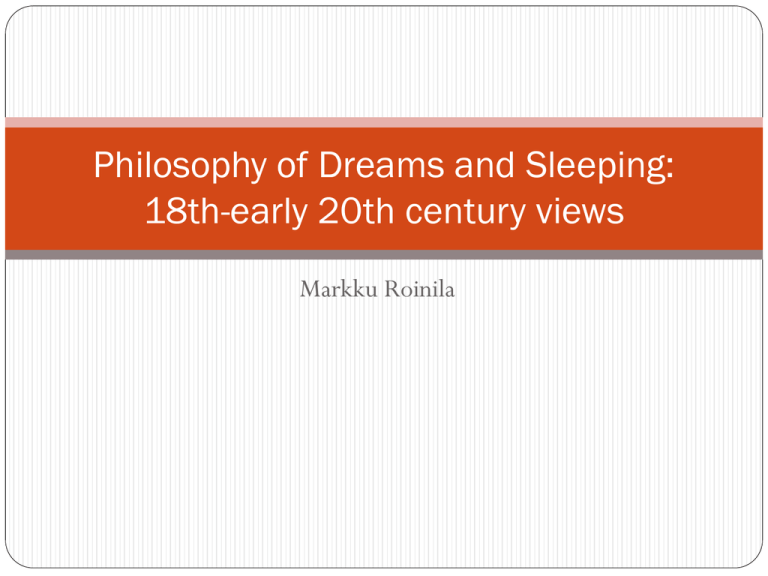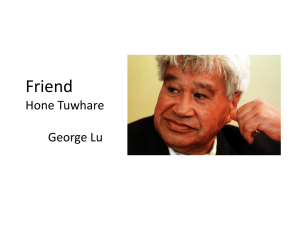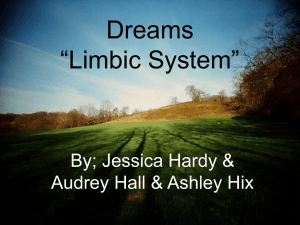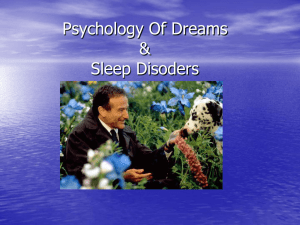18th-20th century views
advertisement

Philosophy of Dreams and Sleeping: 18th-early 20th century views Markku Roinila Continuation and variation Whereas the Early Modern philosophers discussed more or less of the same problems posed by Descartes, in Enlightment and German idealism there are really not new themes. Philosophers discussed various old problems, sometimes giving them new solutions and variations to old solutions. A good example is the divination-theory. Being secular philosophers, the Enlightenment thinkers opposed the idea and tried to explain the dreams by natural causes. For this reason one common theme is the somatic theory of dreams. Many Enlightenment thinkers and Kant thought, following Hobbes, that dreams follow from somatic impulses like stomac problems or digestion. Hobbes (and Aristotle) was also central influence in that dreams were seen as product of imagination. For example, Hartley wrote: ”Dreams are nothing but the imaginations, fancies or reveries of a sleeping man” (Observations, I.iii.5) – they are founded on somatic impulses, the state of the body. Excess of imaginations was commonly seen as madness – so if the dreaming continues in waking state, there is a mental illness. Voltaire Voltaire (François-Marie Arouet, 1694-1778) thinks that predictive or prophetic conception of dreams is pure superstition and bullshit. Supported the somatic theory of Hobbes – argues that often dreams result from the excess of the passions of the soul. Keyword ’Somnabulists and Dreamers’ in Philosophical Dictionary (1764) Voltaire on creative dreams However, Voltaire has a seemingly contradictory view to the somatic theory: he argues that we often utilize in the dreams our highest rational abilities. Like Leibniz, Voltaire thought that one can make judgements in dreams and once can be creative in dreams. In ’Somnabulists and Dreamers’ he describes a theology student: “You, Mr. Seminarist, born with the gift of imitation, you have listened to some hundred sermons, and your brain is prepared to make them: moved by the talent of imitation, you have written them waking; and you are led by the same talent and impulse when you are asleep. But how have you been able to become a preacher in a dream? You went to sleep, without any desire to preach. Remember well the first time that you were led to compose the sketch of a sermon while awake.You thought not of it a quarter of an hour before; but seated in your chamber, occupied in a reverie without any determinate ideas, your memory recalls, without your will interfering, the remembrance of a certain holiday; this holiday reminds you that sermons are delivered on that day; you remember a text; this text suggests an exordium; pens, ink, and paper, are lying near you; and you begin to write things you had not the least previous intention of writing.” Voltaire is sceptical against Descartes’s dream argument: “Explain to me an animal who is a mere machine one-half of his life, and who changes his nature twice every twenty-four hours.” Voltaire: ’Letter On Dreams To The Editor Of The Literary Gazette, August, 1764’. ” Every dream of a forcible nature is produced by some excess, either in the passions of the soul, or the nourishment of the body; it seems as if nature intended to punish us for them, by suggesting ideas, and making us think in spite of ourselves.” “We must acknowledge, with Petronius, “Quid-quid luce fuit, tenebris agit.” [what happens in the light, continues its existence in the darkness]. I have known advocates who have pleaded in dreams; mathematicians who have sought to solve problems; and poets who have composed verses. I have made some myself, which are very passable. It is therefore incontestable, that consecutive ideas occur in sleep, as well as when we are awake, which ideas as certainly come in spite of us. We think while sleeping, as we move in our beds, without our will having anything to do either in the motive or the thought.” ‘Of Dreams’ “Dreams have always formed a great object of superstition, and nothing is more natural. A man deeply affected by the sickness of his mistress dreams that he sees her dying; she dies the next day; and of course the gods have predicted her death.” Kant As Immanuel (1724-1804) Kant created a systematic new kind of philosophy of his own, he had something to say about dreams also. We have already discussed his early commentary on Swedenborg, the Dreams of a spirit seer which also includes some original views on dreams.The most original one concerns the role played by the mind in dreaming. Kant and the Somatic Theory LikeVoltaire, Kant did not believe in the divination-theory. We do not see prophetic visions or holy enthuasism in dreams. In the Dreams of the Spirit-Seer he followed Hobbes (and Aristotle) in thinking that dreams can be more vivid than waking thoughts because the senses are closed down. He also followed Hobbes in thinking that the dream images are more vivid than images in the waking life. On the other hand, he followed Locke in thinking that when one is asleep, one is separated from the body. According to Kant, when one wakes up, one cannot recall the dream images as being part of the same person. Kant seems to think that because in the sleeping state the body is not disturbing the active mind, we can think better. He says in Dreams that those who are sleepwalking have more intelligence than normally, although they cannot remember anything when they wake up. Dreams are not really sleeping Kant says that when we are seeing dreams, we dot not sleep completely. We are perceiving distinctly and turn our inner actions to impressions from outer senses. In this way one can remember them afterwards, but they are considered as wild and irrational imaginations, because the fantasies and perceptions by outer senses are mixed together. In other words, the soul is projecting itself to the dreams where inner images and sensible external images are mixed with each other. Because of this mixture the dreams seem strange to the waking person. In this way it seems that the mind is active in the process. Thus Kant seems to agree with Descartes that we are always thinking. In Kant’s critical philosophy, dreams are not fully determined by the categories, but they are connected to the understanding: to dream or to hallucinate is necessarily to have experience expressible in judgemental form – the intentional objects of dream are dependent on the categories in the end. In this way dreams objects of inner sense. Some other 19th century views Goethe thought that in dreams we heal our problems, gain consolation and once we wake up, we are joyful and ready to face the new day (compare Hobson) Ralph Waldo Emerson emphasized the connection between dreams and character. Dreams reflect our character, especially those characteristic which are not notable in the behavior of the waking life. We can also recognize in the dreams of other persons their hidden forces which affect their behavior and in this way we can often predict their future actions (compare Freud). Henri Bergson (1859-1941) on dreams Close to Locke’s theory – he thinks that there is a vast reservoir of memory fragments in us which form the content of dreams. But Bergson gives it a Freudian twist – these fragments are forgottent, latent content of dreams. According to Bergson, our memories form at all times a sort of pyramid and its point penetrates to our current activities. We will forget nothing. When I am dreaming, all these memories rise from the cellar of our mind. Therefore there is a great difference between the sleeping and waking state. In dreams we are indifferent and we are interested in only somatic impulses.





